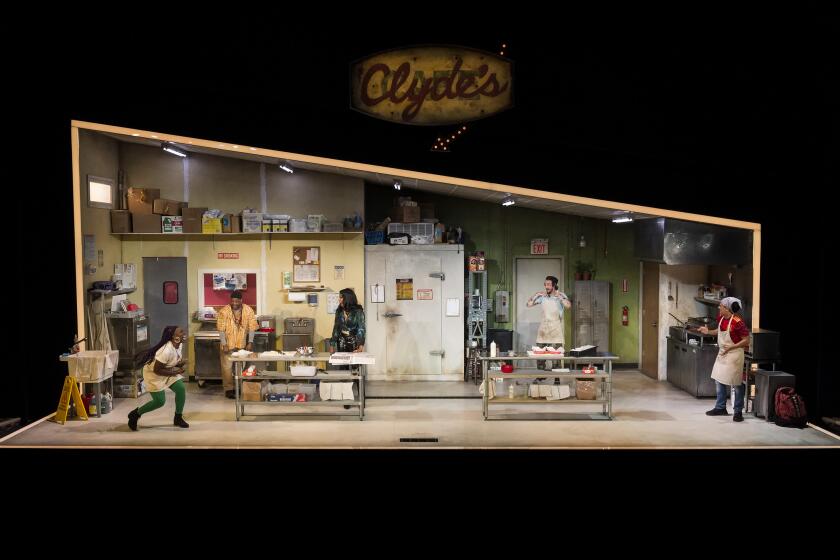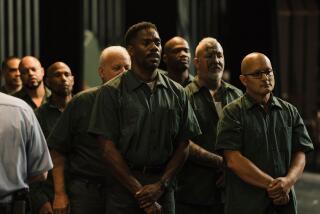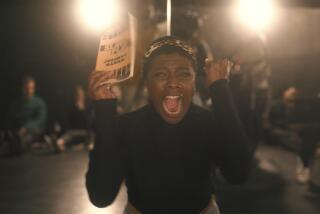The Rev. Martin Luther King Jr.’s last night on Earth imagined in clear-eyed ‘Mountaintop’
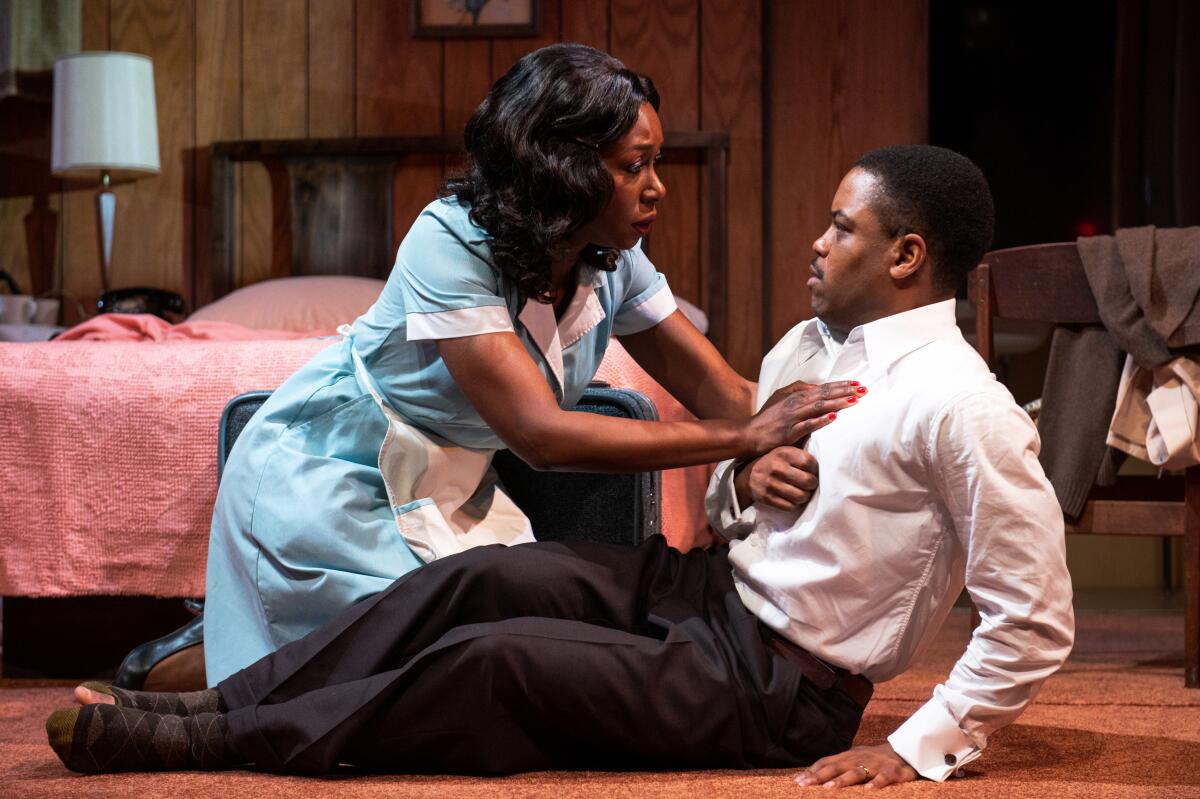
“The Mountaintop,” a play by Katori Hall that had its Broadway premiere in 2011 in a production starring Samuel L. Jackson and Angela Bassett, momentously takes place at the Lorraine Motel in Memphis on April 3, 1968 — the eve of the Rev. Martin Luther King Jr.‘s assassination.
This two-character play, which opened Thursday at the Geffen Playhouse and is written by one of the co-writers of “Tina: The Tina Turner Musical” (now at the Hollywood Pantages), imagines the night before King is fatally shot on the balcony outside his second-floor room.
Played by Jon Michael Hill (who was nominated for a Tony Award for his performance in “Superior Donuts”), King has just delivered his “I’ve Been to the Mountaintop” address at Mason Temple in Memphis. He’s already at work on his next oratory, which sets out to explain “why America is going to hell.”
“They really gonna burn me on the cross for that one,” he mutters to himself. He fears reprisal, but the worry only seems to fuel him. “America, you are too arrogant,” he thunders, overcoming his inner censor.
The struggle has taken a toll on King’s health. While waiting for fellow civil rights activist, the Rev. Abernathy, to return with a pack of Pall Malls, he collapses in the room in a coughing fit. His socks are torn from marching, and the smell of his shoes puts him off.
Hall begins “The Mountaintop” with a close-up of the man. King is not yet a martyr, though the speech he just gave at the Mason Temple had intimations of mortality. (“I may not get there with you. But I want you to know tonight, that we, as a people, will get to the Promised Land.”)
Facing a budget shortfall of millions of dollars, Center Theatre Group on Thursday announced that it will lay off about 10% of its full-time staff and pause season programming at Mark Taper Forum after “Transparent” concludes its run on June 25.
Before going on this trip, he gave his wife artificial flowers instead of the real flowers he usually leaves when going on the road. Death is not a distant reality. The feds are spying on him and white supremacists are lurking in the shadows. But there’s so much social justice work to be done.
Enter Camae (Amanda Warren), a newly hired motel maid who is spirited, flirtatious, opinionated, a little goofy and independent.. Living up to his reputation as a man who enjoys the company of good-looking women, King is entranced. He bums a cigarette off her and draws her into conversation.
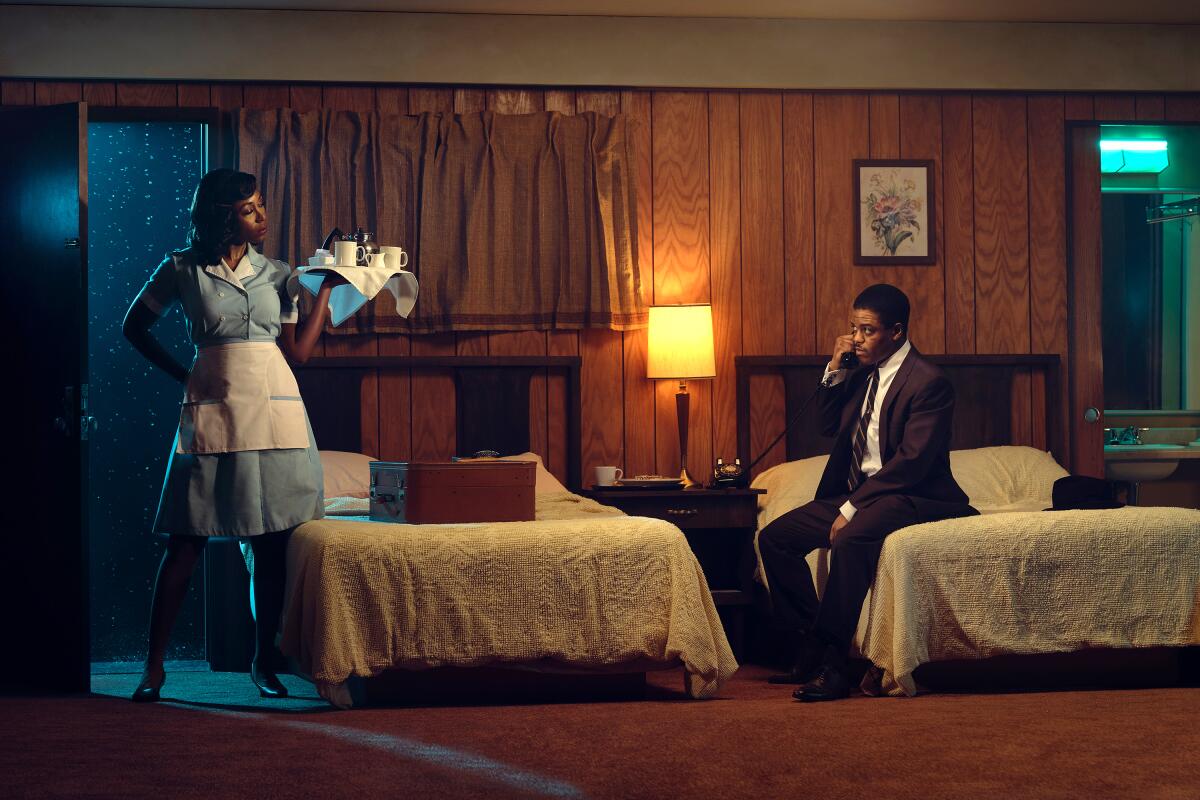
Camae reveres the civil rights leader, but she’s not afraid to challenge him. She believes his tactics aren’t forceful enough. The time has come, in her view, for a more confrontational approach. Folks are running out of patience with the pace of nonviolent direct action. “Like I say,” she says, “walkin’ will only get us so far.”
There’s something unusual about Camae. For all her nervous flutter as a newbie hotel employee, she has a confident, strangely knowing air. King suspects that she might be a plant after she starts calling him by his given name, Michael. Could she be someone hired to tempt him, to expose him as an adulterer? He knows that there are no lengths to which his enemies won’t go, and he doesn’t want to cause his stalwart wife undue suffering.
The fictional dimension of “The Mountaintop” grows wilder as the nature of the business between King and Camae is revealed. The artificial situation Hall sets up has the feeling of an extended sketch. Dramatic momentum isn’t easy to sustain under these confining conditions. The leap from realism provides a wobbly way out.
The plot is mostly conversation, much of it digressive. This 90-minute play, performed without intermission, isn’t in any hurry to move beyond the exploratory phase. Hall sifts through a range of thematic material to view King through a female perspective that’s both devoted and clear-eyed.
Camae, who readily accepts that a saint can also be a sinner, offers a sympathetic critique. She herself contains contradictory dualities and leads King to a deeper acceptance of his own.
Katori Hall reaches for the divine — and Broadway
The actors infuse the production, directed by Patricia McGregor, with fresh theatrical interest that patches over the dramatic lulls. One might expect the historical figure at the heart of the play to be the dominant force, but “The Mountaintop” really belongs to Camae, who more than holds her own against the august Reverend.
Warren is mesmerizing in the mercurial role. Her Camae strides around the motel room (designed with exactitude by Rachel Myers) to tidy up the bed or give King another cigarette. She’s solicitous but also at times impudent and defiant in a flamboyantly humorous way. While basking in his attention, she’s quick to establish certain boundaries. King may be a world-famous preacher, but she’s in charge when they’re alone together.
Hill’s King is humane and impassioned. Every now and again, a shadow of guilt or doubt crosses his face, Will he be granted enough time to advance the cause of racial and economic equality in America? He recognizes that the odds aren’t on his side. Hill might not have King’s charisma, but he is stirringly connected to his cause.
“The Mountaintop” moves into a more incantatory mode at the end. Hall allows the characters to meditate on history and the nature of political struggle. The power of the acting intensifies as Camae and King survey the long road ahead to the Promised Land.
"The Mountaintop"
Where: Gil Cates Theater at Geffen Playhouse, 10886 Le Conte Ave., L.A.
When: 8 p.m. Tuesdays-Fridays, 3 and 8 p.m. Saturdays, 2 and 7 p.m. Sundays. Ends July 9
Tickets: $39 - $129 currently
Contact: (310) 208 - 2028 or www.geffenplayhouse.org
Running time: 1 hour, 30 minutes
More to Read
The biggest entertainment stories
Get our big stories about Hollywood, film, television, music, arts, culture and more right in your inbox as soon as they publish.
You may occasionally receive promotional content from the Los Angeles Times.
